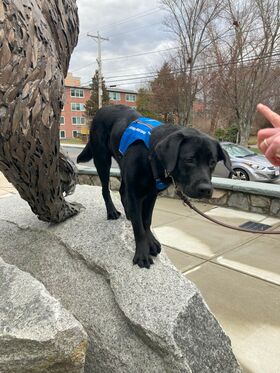
Bridgewater has a lot to offer, and different ways for students to come together, to meet new people with common interests and become well rounded. I think this program is a really good way for students to get involved in this way.
Last year, those living on the fifth floor of Crimson Hall may have noticed a special resident living among them, a very friendly one that provided lots of tail wags.
Watkins, 4-month-old black Labrador retriever, arrived on campus to live with Ashley Schepis, ’24, G’26, as part of the Guiding Eyes for the Blind at Bridgewater State University program.
“The BSU community was very welcoming of Watkins, he became a familiar face on campus and people were always really excited to see him and respectful when he was working,” Ashley said.
Originally called Bear Paws for Puppy Paws, the Guiding Eyes at BSU program was started in early 2020 by Dr. Brian Payne, interim dean of the College of Humanities and Social Sciences, through a partnership with Guiding Eyes for the Blind, a New York-based nonprofit organization. Student volunteers are used to train dogs as service animals for the visually impaired.
The program was derailed during COVID, but Ashley took the initiative to bring it back to campus, even serving as president.
“After talking to Dr. Payne, I wanted to make it a club again. I wrote up the constitution, and then had to get people interested,” Ashley said.
Once re-established, Ashley decided to then become a “raiser.”
Raisers work in teams to train dogs over a 12-13 month period. They are given all the information needed to help train the dogs in areas like potty training and teaching basic commands.
The most important part of being a raiser is getting the dogs to socialize. This is key to their development, because once paired with their forever person, the dogs are exposed to a variety of environments and must be able to perform in each.
When Watkins lived with Ashley at BSU ,he went everywhere she did. To class, the dining halls, the residence halls, the Maxwell library, and the walking trails on campus.
“It was a lot, but really rewarding,” Ashley said. “It teaches you to be selfless and responsible.”

Once the training with raisers is complete, the dogs are brought back to Guiding Eyes for the Blind headquarters in New York where they partake in the final leg of training before being matched with someone who is visually impaired.
Saying goodbye to Watkins wasn’t easy, Ashley admits.
“It’s a three-hour drive and I cried the entire way there,” she said. “It was sad to see him go, but you know you’re doing a good thing.”
And when Watkins officially graduated from the program, Ashley got to see him one more time when she was invited back to be part of the ceremony and got to meet the person Watkins was paired with.
“We got to share a dinner, sit, and talk about Watkins, about life in general. It was really nice,” she said.
Since graduating from BSU with a degree in early education and minor in history, Ashley has been working full-time as a kindergarten teacher in Taunton while pursuing her master’s degree in early education, also from BSU.
In the future, she plans on raising another dog and hopes other Bridgewater students consider participating in the program as well. For those with questions they can email her at aschepis@student.bridgew.edu.
“There are ways to be involved, other than being a raiser, but most of all it’s a rewarding program to get involved with,” she said. “Bridgewater has a lot to offer, and different ways for students to come together, to meet new people with common interests and become well rounded. I think this program is a really good way for students to get involved in this way.”
Do you have a BSU story you'd like to share? Email stories@bridgew.edu